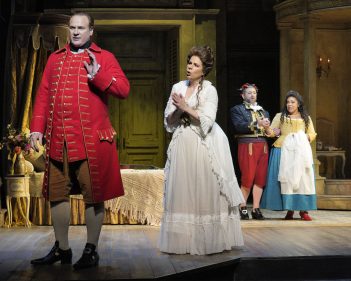At the Dorothy Chandler Pavilion, the LA Opera Season starts with a woke version of Mozart’s The Marriage of Figaro as Rihab Chaieb Offers a Dazzling Take on Cherubino.
By John Lavitt
Los Angeles, California (The Hollywood Times) 02/06/2023 – After watching the brilliance of musical interpretation and precision in the Academy Award-nominated Tár, this critic feels almost hamstrung when reviewing The Marriage of Figaro at the LA Opera. Although we know what we like and the dramatic underpinnings of the storyline are simple enough, the complexity of the music very well could be beyond our understanding. Still, we will do the best we can with the tools the universe has given us. Indeed, there are clear preferences to be made.
With music by Wolfgang Amadeus Mozart and a libretto by Lorenzo Da Ponte (after the play by Pierre Beaumarchais), The Marriage of Figaro is a staple of classical opera. Conducted by James Conlon and directed by James Gray, the production lives up to the quality one has come to expect from the LA Opera. Moreover, the set design by Santo Loquasto and the costume design by Christian Lacroix are sterling perfection. The costumes fit perfectly in the eighteenth-century world created by the set design.

The cast overflows in a 21st-century woke production with actors of different ethnicities and cultural backgrounds. However, nothing in the casting is as radical as the choice of Rihab Chaieb as Cherubino. Her appearance was generously underwritten by a gift from the Piera Barbaglia Shaheen Next Generation Artist Award. Such a step makes sense because the Tunisian-Canadian mezzo-soprano is one of her generation’s finest singers and performers, with wonderful inflection and control. A beautiful young woman, she plays the beautiful young man who poses as a woman in the storyline to fool the Count. In a post-modern fashion, the performer’s reality transcends the subterfuge of the storyline.
As the show’s highlight, Rihab Chaieb demonstrates vocal and acting prowess, singing her parts with distinction and character. Even more importantly, her acting is superb, providing the comedic highlights of the show. As Cherubino, she conveys a resonant balance of innocence and rakishness. Beyond her vocal modifications, the use of her body is precise and foppish. At times, it feels like Rihab Chaieb has stepped out of a Charlie Chaplin movie and into the show. Such physical control is challenging when singing in such a demanding fashion.
The rest of the cast is excellent. Figaro and Susanna (Craig Colclough and Janai Brugger) help get the opera’s story moving forward with their passionate demonstrations of love and deception. The American bass baritone and the American operatic soprano show why they are in such demand in opera halls across the country. Puerto Rican soprano Ana Maria Martinez is the emotional heart of the opera as the countess, and her powerful soprano captures both the audience and the stage during her starring moments. Although the rest of the cast is fine as well, the male highlight of the show is Lucas Meacham as the Count.

As the Count, Lucas Meacham is a powerful and imposing figure. Every time he is on stage, he demands recognition with his enormous size and booming baritone. Played with conviction and lust, the desire of the Count tells the story of the tale. Women battle against the desires of men that want them as their latest conquest. Ultimately, nothing matters to the women than keeping the desire of their men squarely projected upon themselves. Indeed, in the times of Mozart, there was no easy way to say no, and there was no hope for a “Me Too” moment to free the sexual prisoners.
In the end, no matter how woke the casting is, the true nature of the storyline remains unchanged. Reflecting the time when it was written, the libretto of The Marriage of Figaro is simplistic and chauvinistic. Writing after the play by Pierre Beaumarchais, Lorenzo Da Ponte tells a story where women are reduced to the objects of men’s desire. They want to be the objects of only their beloved’s desire, but they ultimately are okay with being reduced to objects of desire.

In the future, perhaps, a retooling of the libretto will be needed in such a manner that maintains the music while changing the meaning. Although Mozart’s score always will be sacrosanct, could not the wordsmiths of the day revise the story to reflect a tale that does justice for all? After all, doesn’t the brilliance of maestro James Conlon and his orchestra require a storyline that reflects their artistry?





